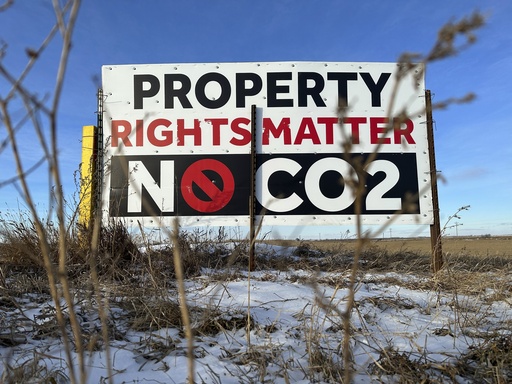After years spent trying to gain regulatory approval for a proposed carbon dioxide pipeline intended to snake through the Midwest, the effort could be complicated even further if South Dakota voters reject a law passed by the Legislature that pipeline opponents say is an attempt to squelch local control and speed approval of the pipeline.
State officials this week validated the referendum for the Nov. 5 general election, enabling voters to decide whether to reject a package of regulations approved by the Legislature earlier this year. Pipeline opponents argue the regulations would strip county officials of the ability to pass stringent rules that can all but ban such pipelines, while legislative leaders say they intended to add requirements to help landowners even as they limited the role of county governments.
The law takes away authority from local governments and consolidates it with the three-member state Public Utilities Commission, said Jim Eschenbaum, chairman of the South Dakota Property Rights and Local Control Alliance, formed by landowners and local officials to oppose the project.
“I honestly believe a majority of South Dakotans think this pipeline is foolishness. I’m one of them,” he said. “I think it’s just of bunch of hooey and a big taxpayer boondoggle.”
Iowa-based Summit Carbon Solutions has proposed the $5.5 billion, 2,500-mile (4023.4 kilometers) pipeline network that would carry planet-warming emissions from more than 50 ethanol plants in Iowa, Minnesota, Nebraska, North Dakota and South Dakota to be sent deep underground in North Dakota.
Summit has faced opposition and setbacks throughout the Midwest. But North Dakota regulators are reconsidering an earlier denial of a permit, and last month the Iowa Utilities Commission gave conditional approval to Summit. Last year, South Dakota regulators denied Summit’s application for a permit, but company officials have said they will file another application this summer.
The pipeline is seen as crucial for a potential future aviation fuel market for the Midwest-based ethanol industry, which buys roughly one-third of the nation’s corn crop. In opposing the pipeline, some landowners question the forced use of their property and raise the danger of ruptures that could release hazardous CO2 gas. They also are critical of lucrative federal tax credits for carbon capture projects.
House Majority Leader Will Mortenson said he believes the pipeline will ultimately be built whether the regulations are in place or not, so he helped introduce the new law because it adds new requirements, such as minimum depth requirements for the pipeline, liability on pipeline operators for damages and disclosures of pipelines’ plume models. The law also allows counties to impose a surcharge of $1 per linear foot on CO2 pipelines whose companies claim federal tax credits.
“If this gets shot down, that pipeline’s going to get built with no landowner protections and no plume study released and with(out) a whole bunch of the other benefits that we fought real hard to get included,” Mortenson said.
Mortenson, an attorney, said he sees the benefit for the ethanol industry, but also understands farmers’ and ranchers’ concerns and sees the need for the regulations in the law.
While supporters have called the law a “landowners bill of rights,” Republican state Rep. Karla Lems opposed the legislation, calling it “the pipeline bill of rights.” She said the law sets the stage for other companies like Summit and future solar and wind projects to roll through, unhindered by local concerns.
Lems’ family has land that was in the paths of Summit’s proposed pipeline and another pipeline project that was canceled last year.
Asked for comment, Summit spokeswoman Sabrina Ahmed Zenor called the law “pro farmer, pro ethanol and pro business. It protects landowners and provides property tax relief.”
___
Dura reported from Bismarck, North Dakota.
Source: post





